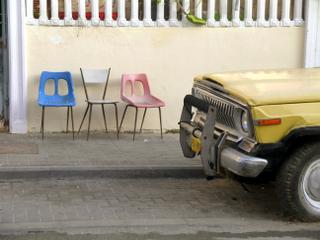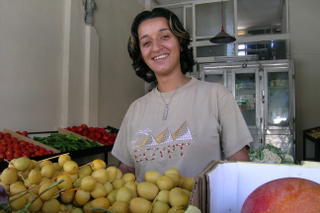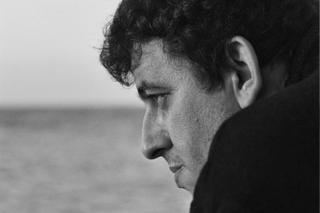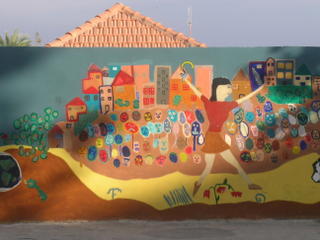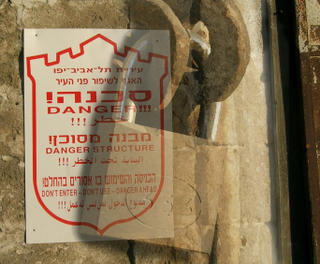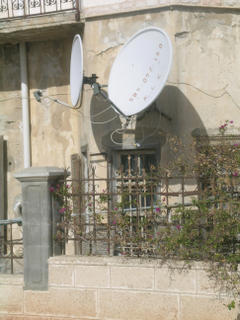Rubble Rubbish Everywhere, especially in the air
 Once upon a time. many many years ago (but not very far away), there was a lovely princess, named Andromeda*....
Once upon a time. many many years ago (but not very far away), there was a lovely princess, named Andromeda*....Jaffa was once known as the Bride of the Sea, a lovely meditarrenean city. Sea on one side, surrounded by orange groves on the other. A city of flowering gardens, a wealthy city due to its port, which served all of the country.
After 1948, after most of its original inhabitants had been made to leave, much of Jaffa stood empty. In many of the lovely villas and ancient houses, the plates cups and saucers were still on the table, sometimes the food still on the stove. People had left in a hurry, without taking much with them. They hoped they would be back again, soon.
Instead they found themselves in the refugee camps of Gaza and Lebanon or spread throughout the world, still longing for the lovely beach, the smell of orange flowers in the season, cold water melon on a hot summer night.
Yet, were they to visit Adjami today, they would have a hard time recognizing it. Many, thousands, of the beautiful old houses were torn down, leaving big scars in what used to be busy streets. The rubble of those houses was dumped on Jaffa's beach, creating a huge mountain of rubble, a few hundred dunams in size and 15 meters above the sea level, hiding the sea. Kedem street, which was once right on the beach, is far away form the sea today. Looking at aireal photographs made a mere 30 years ago, the beach looks completely different.
Later on, people from all over Tel Aviv started to dump their building rubble on the mountain as well, thus creating the "Har HaZevel" aka the Rubbish Mountain. Doing so was legal, it was, in fact, encouraged by the Tel Aviv municipality.
The huge monster mount disconnected much of Adjami from the sea, no longer a bride and definitely not of the sea.
Over the last 15-20 years Jaffa's people fought against the mountain (which according to the original planners was to become a villa neighborhood for Tel Aviv's wealthy, attracted by its orientalistic character). The fight was relatively successful, in the sense that further rubbish dumping was declared illegal, and the mountain is supposed to be turned into a park, as park for Jaffa's people first of all.
Plans were made and a small effort was made by the mishlama (a unit of the Tel Aviv municipality responsible for much of the running of the municipal services (and the lack thereoff, but that's another item) to ask us, Jaffa's people, what we want.
This was done by means of meetings of "focus groups" ("Devide and rule" has been an effective method for many years). The park plan will serve us, and ofcourse it is a million times better than the current situation.
This week the plan was presented by Dror Amir, of the Mishlama: part of the mount will be reshaped by removing part of the rubble and grinding it up. The mountain will be reshaped, and planted with local plants and tress, paths, cycle paths and beaches will be part of the concept. It looks not bad at all on paper.
Paths will run naturally from the streets leading to the park (Dudaim, Mendes France etc.) to the sea and the beach.
About 50 million will be spent on the project, which i hope wil give us a wonderful place, a new bridal dress perhaps for a somewhat weary "bride of the sea".
What very much worries me, is the method they have selected for getting rid of the rubble: grinding it.
The mountain contains, in addition to stone, concrete, marble, tiles, iron etc also lots of strange materials, some unknown and some of very ill repute, such as e.g. asbestos.. The wind on the beach is usually landwards, right into Adjami. The grinding process (expected to take about 2 years of daily work) will create lots of dust. And that dust will go to.... you got it. into our houses, noses, heads, lungs.
They (the contractor, the municipality) are supposed to run air quality checks, and when things are "too bad", halt the grinding process.
They told us "not to worry", "all will be well" and "trust us". Whenever i hear these sentences i get nervous, very nervous.
* Andromeda was a princess in Greek mythology, who was tied to a rock as an offer to pacify a sea monster that kept eating the poor fishermen. The story had a happy ending when the oor girl was saved by her hero and they lived forever etc. All of this happened in Jaffa, the rockformation, called "Andromeda's Rocks, can still be seen.

